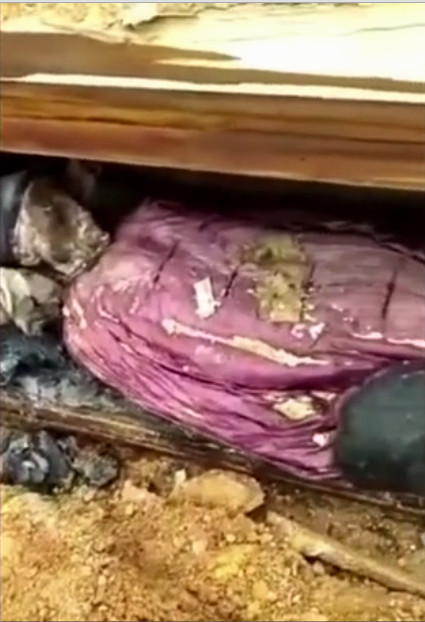Chinese aristocrat remains intact after 1,000 years
Chinese construction workers were surprised to find the coffin more than 1,000 years old containing the intact body of a man.
The coffins and bodies were excavated in Zhizhu village in An Hoa district, Hunan province, China. The man was allowed to die under the Ming Dynasty (1368-1644) or Qing Dynasty (1644-1912), Mirror reported on September 1.

Chinese noble mummy.
The body wore a garment made from fine fabrics, placed next to the favorite paper fan. The coffin of the man is made from premium limestone and wood, helping to preserve the corpse.
The Chinese Cultural Heritage Agency said the man could be a noble or have a rich background. The mountain found the coffin owned by a Wang family.
According to the authorities, the grave was discovered by chance by the excavator. Experts believe that this is the first intact corpse during the Ming or Qing period found in the town. The coffin and the corpse of the man were transferred to study.
Construction work in the excavation area has been halted. Authorities have not disclosed whether they are looking for the surviving descendant of the man, although they can determine their names as well as the burial place of the dead.
- The mystery of the corpse after 23 years remains intact
- Excavating an ancient tomb containing an intact male human body suspected of being an ancient Chinese aristocrat
- The marine fossil remains intact after 525 million years
- Found the remains of ancient people 3,500 years ago
- The bird buried under the ice for 4,000 years remains intact
- Detecting the remains of 'hug each other without leaving' for 6,000 years
- Discover intact marine life in amber 99 million years
- Found 16,000-year-old human skull nearly intact
- The erosion coast reveals six remains hundreds of years old
- Discover two intact ancient tombs in southern Greece
- 97 5,000-year-old remains were deformed in a house of 20 square meters
- The remains of a thousand year old skin remain intact after the storm in Ireland
 Discovered an ancient centipede fossil 99 million years old
Discovered an ancient centipede fossil 99 million years old Discovered bat-like dinosaurs in China
Discovered bat-like dinosaurs in China Discovered a 200-year-old bronze cannon of the coast
Discovered a 200-year-old bronze cannon of the coast Discover 305 million-year-old spider fossils
Discover 305 million-year-old spider fossils